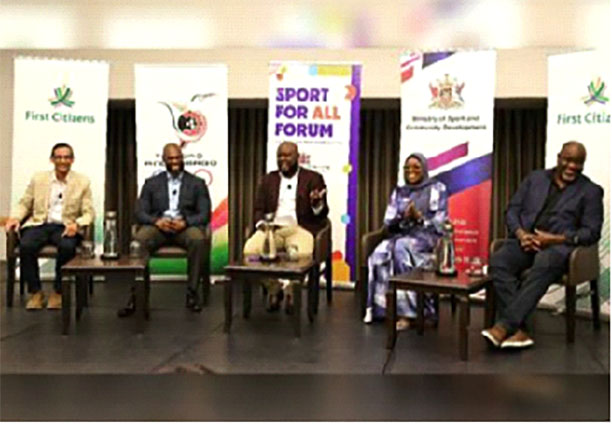By Roger Seepersad
(Trinidad Express) “We try to make players and that is not what this is about at the younger ages, it is about making an athlete.”
Trinidad and Tobago Olympic Committee (TTOC) high-performance coordinator Anthony Marcano, speaking during the Sport for All Forum held at Hyatt in Port of Spain recently, pushed for a change in approach to coaching young children by shifting from trying to creating players for specific sports and instead focusing on creating an athlete.
“Sport for all is about inclusion,” he said during the first panel discussion at the forum which dealt with the role of Sport for All and physical activity in national development.
“We need to understand how we interact with children at different ages and stages because we don’t want to overburden the children that they come out of sport,” Marcano explained. “Expose them to as many sports as possible so that at, let’s say age 14, they can choose what pathway they want to be on so that we would not have made a player but an athlete,” he added.
Gabre-Jesu McTair, director of physical education at the Ministry of Sport and Community Development, agreed that children should be exposed to different sports.
He said the education system has become a lot more academic-focused and that there was a “dearth of sport participation in school.”
He also noted that where children are involved in sports, the focus is placed too much on the competition aspect. “In a lot of cases parents push a child in one sport and we need to educate parents as well so they will understand the role they play in the development,” McTair explained.
He continued: “An athlete that has a base in multiple sports is a better athlete…(but) we have become very tunnel-visioned as it relates to the parent saying ‘I want my child to be a football player or to be a swimmer’ so you stick them in that sport from four years old and that will be to the detriment of the child, both from the ability to express themselves in different ways to their own physical development towards being a better athlete, and we need to take that into account.”
Board member of The Association for International Sport for All (TAFISA), Kieth George underscored the importance of physical activity for the next generation, warning the audience that “our children are going to live less long than us”.
“For the first time in 150 years, our children are going to live less long than us. The last 150 years with public health initiatives, we’ve seen massive increase in our longevity and there are multiple things that play into that,” George explained.
He continued: “Because of the challenges we face, those people born now may live less long than we live. It is worse than that. Those people born now will likely have lower number of years of independent, health-free living. Because of positive changes in our health services and treatments, we will have people living longer in ill health and dependency which has a massive impact on us socially, medically and financially.” George argued that one of the most effective methods of increasing independence and life years is being physically active from the earliest possible age and into your elder years as long as you can.
“Every single predictor of independent living is physical activity status. If the answer is so easy, just being physically active, why isn’t everybody doing it? Let’s be perfectly honest, that the challenge is difficult, and when it is difficult, it requires multiple actors to support the individuals.” McTair also acknowledged the role sport plays in national development.
“When sport is available to all regardless of age, gender, ability or socio-economic status, it becomes a catalyst for progress.”
He said the Ministry of Sport is dismantling barriers to participation and making sport a part of daily life for everyone.
“When sport reaches every person, it drives transformation, bridges the divide and supports national progress,” McTair declared.

